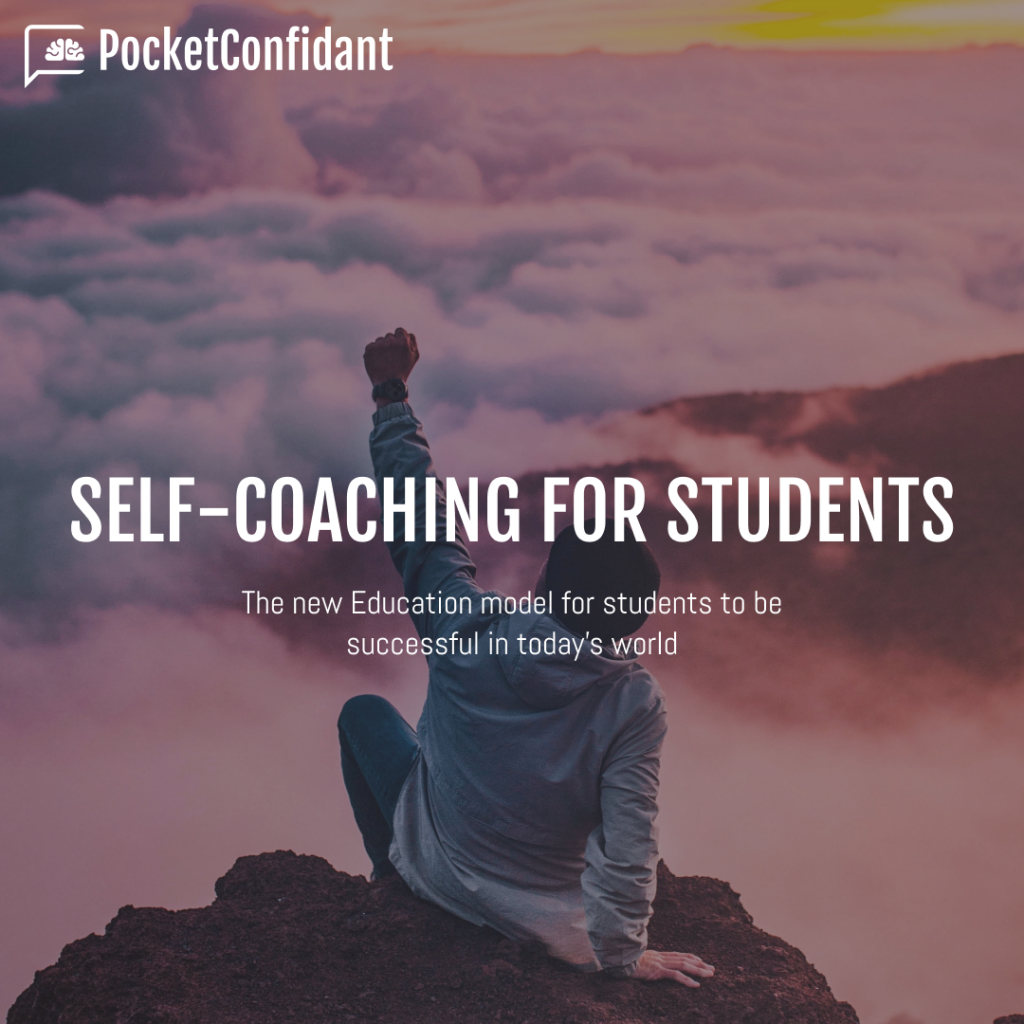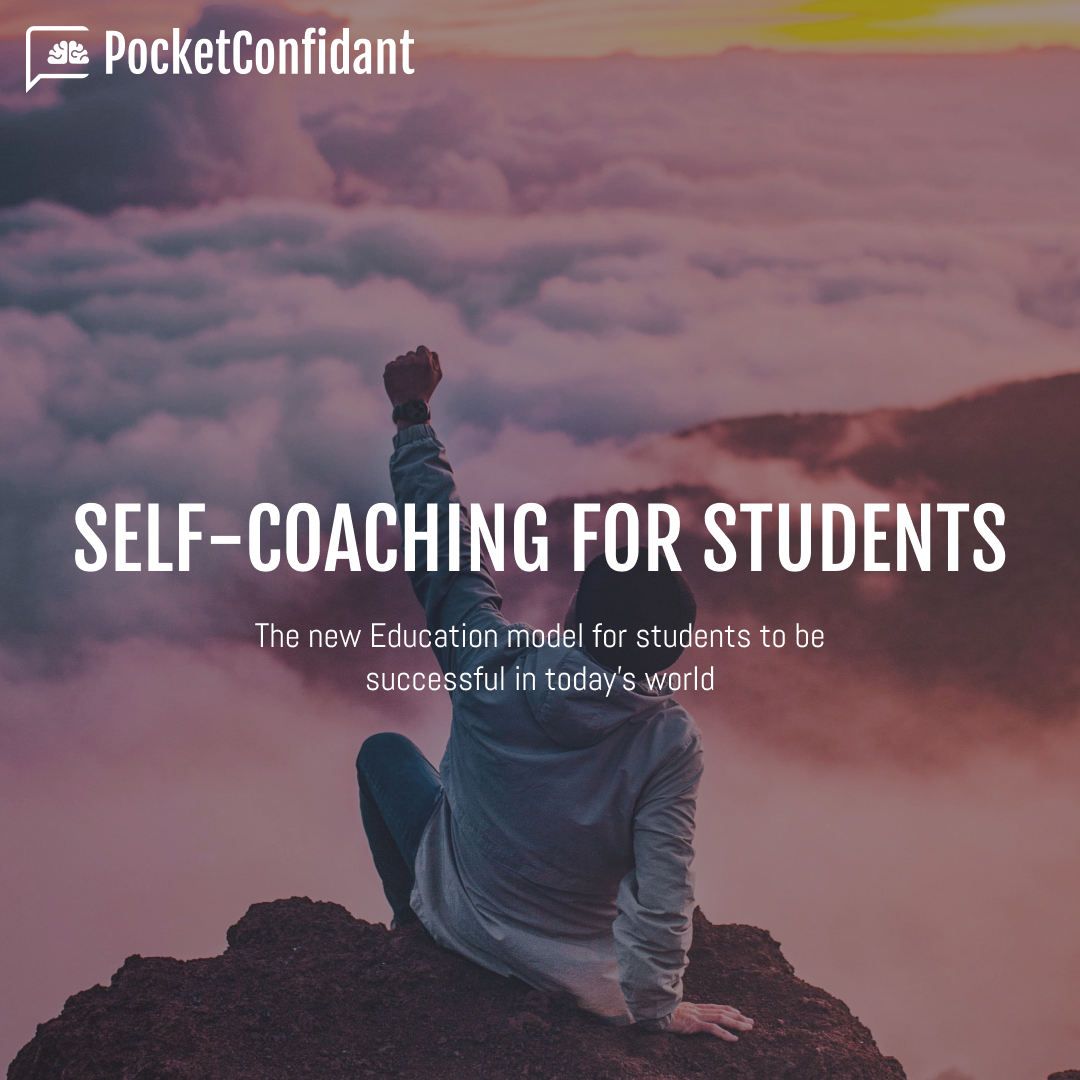
My name is Nour and I’m a graduate student with a bachelor’s degree (Hons) in International Business Management. My academic journey was disoriented, full of questioning, pressure, and lack of support for my personal and professional development. I learned over my academic years and experiences that the only change or accomplishment you want to achieve comes from you. No one can know what’s best for you or understand your state of mind. However, as a student we most often don’t know (not taught) how to deal with that and how to support ourselves for addressing our own challenges and our own goals.
I discovered an approach, and a tool, that perfectly matched with my problem. It’s called PocketConfidant. I’ve used it for more than a month and I’m still using it. It was a realization for me. Below I first introduce why self-coaching is important along with the support of other students who know about it, and I will then tell you about the tool, what it offered me and how easy it is to use it. You can also watch this video where we’re talking about (5 minutes) with other students and PocketConfidant’s founder.
Self-coaching, an easy approach to develop our own student capabilities.
Reusing the work of UC Santa Barbara Professor Stephen Duneier from his book AlphaBrain, self-coaching has a very similar approach to what Professor Duneier describes: “it’s a hassle to properly define decision problems. It requires that you silence the voices in your head, and those around you, that are constantly pushing you to take action before proper analysis and prioritize with incomplete information. […] It takes serious efforts to concentrate your attention on the bigger picture, to contemplate deeper meaning and objectives. It’s far easier to just “get this out of the way” and then get to that other stuff. Problem is, we rarely get to the other stuff. […] Simply by reframing the problem, new solutions – often obvious ones – will suddenly appear, seemingly out of thin air. In that moment your frame expands. With this new solution lying firmly within the bounds of your new frame, and certainly well within your skillset, it becomes impossible to understand how you missed such an apparent solution.”
Now, reusing a few other students’ experiences, here is what we can learn about the self-coaching approach and the tool I was referring to.
Wokedje, master’s degree student says: “PocketConfidant is a reflection tool that guides users to problem resolution. The emotional brain reacts to an event more quickly than the thinking brain. Further, one’s reaction to an event varies on an individual basis because it is inherently rooted in culture and previous experiences. Thus, self-coaching is important because it equips a user with the personalized tools necessary to navigate their individual situation. More specifically within an academic context, students face an array of challenges in their attempt to adapt to a new learning environment while also managing novel aspects of their lives such as finances, living abroad etc. A technology like PocketConfidant can facilitate decision making by fortifying a student’s sense of judgement through coaching. Because the coaching technology has the ability to highlight emotions and patterns that are often subconscious to us, we engage with the root of the problem to develop sustainable goals and solutions.»
Aurelie, master’s degree student says: “I first signed up on PocketConfidant seeking advice on how to prepare for an admission interview. I didn’t know anything about this technology and thus didn’t have any expectations from it apart from getting practical tips on the interview process. But eventually, this tool turned out to be much more than an advice provider. PocketConfidant is a self-coaching tool that guides you towards problem resolution by highlighting thoughts and emotions to uncover hidden perspectives. By doing so, we are progressively gaining the ability to identify the root of our problem and enter into the resolution process. This approach provides support during tough periods or periods of transition that are often experienced by students. From what I’ve experienced so far, I would say this technology helped me a lot in terms of self-reflection and self-confidence. By encouraging me to always go into further and deeper thinking, it allowed me to get to know myself better, both emotionally and intellectually. After a few weeks of self-coaching, I can already observe significant improvement in the way I deal with issues in general. I feel like the coaching process is overall hugely rewarding and I can see myself thriving as I further progress.”
How technology can empower students in a private, personalized and self-paced way.
PocketConfidant AI is working on an innovative technology to make accessible to students what was once reserved for the few, and this is personal coaching redesigned to become self-coaching. PocketConfidant is a great tool for self-coaching. It offers a range of opportunities to find answers to your issues as a student and support you with the actions you want to take. It’s very simple to use. You register in a few seconds, explaining the most important issue you are facing, for instance, preparing for interviews, finding your passion, dealing with self-organization, self-motivation, creativity or finding a job or an internship. Once done, everything happens through your emails in a very private and personalized way. Emails are designed to follow your behavior, thoughts and feelings, and help you craft your own goals within a week or two depending on how fast you work on your emails. Once you clarify your roadblocks and frame the right goals and actions, you benefit from an array of great tailored content, such as weekly reminders that will support you with personalized resources and tips, as well as videos made by experts, and podcasts made by both students and coaching experts. The coaching videos and the student podcasts deal with specific issues to give you practical tips and advice, research or scientific insights, and are made in a way that you can directly apply the information. Last but not least, if you need to, you can buy the services of a human coach, to chat with students trained on and passionate about coaching or experienced professional and certified coaches. This unique tool helped me realize by myself what were the reasons for my issues, identify my goals, how to act on them, develop my own actions and push me to develop more of my capabilities and skills.
If you are a student, you get started here.
If you want to know about how to empower yourself with self-coaching technology, here is a 4-steps guide with students’ feedback.
If you want to get in touch with us, write us a message here.
Additionally, if you want to make an impact in the education system and or engage into changing the lives of millions of students around the world, we’re working on self-coaching research and content to help students in a private group on Linkedin, you can submit your application here to become an ambassador or a contributor.
It’s up to you to embrace your potential 😊
Guest blog by Nour Ben Lamine, student
